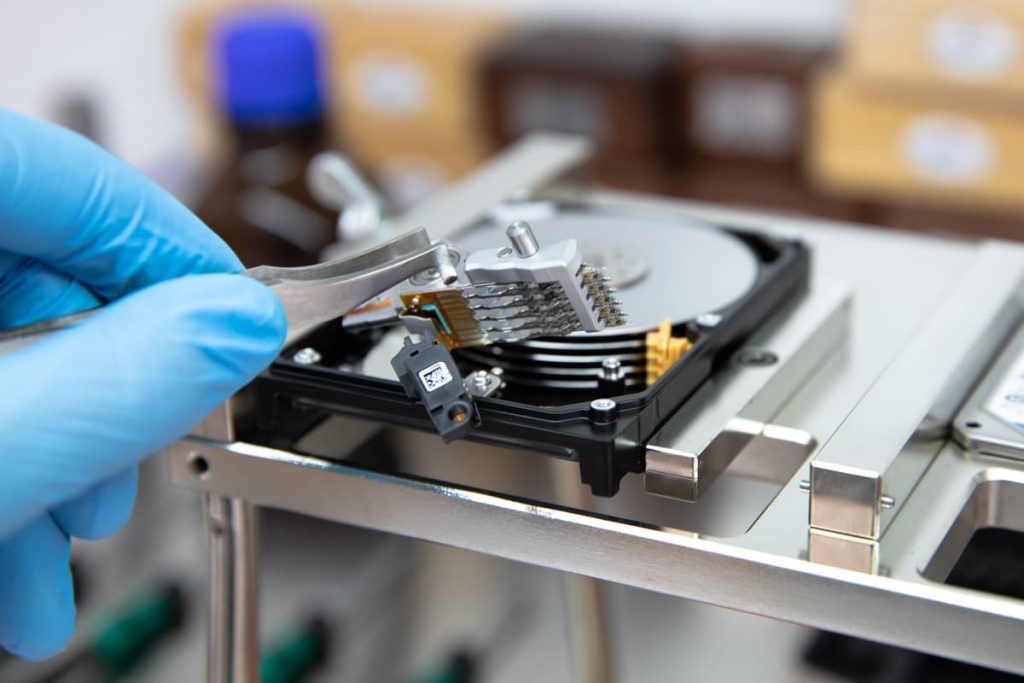Data destruction is the process of intentionally damaging storage media to make the data on it inaccessible and unrecoverable. This is vital for protecting sensitive information from unauthorized access, especially when disposing of old or unwanted electronic devices. Proper data destruction safeguards privacy and ensures compliance with data protection regulations by preventing unauthorized access.
What Is Data Destruction
Data destruction involves rendering data stored on electronic media completely unreadable and unrecoverable, thus permanently removing it from the device. This can be done by physically destroying the device or using specialized software.
When a file is deleted, it’s hidden from the user, but the data still exists on the device’s memory chip or hard drive. Data destruction involves rendering the information unrecoverable, either by overwriting it with random data or by physically destroying the electronic medium.
Why is Data Deletion Important
Businesses of all sizes now rely on electronic media for essential operations, making the secure protection of generated data crucial. However, when it’s time to retire this equipment, you must dispose of it safely. Your company may also have legal obligations for data destruction, especially if you have a global presence. Data privacy laws like GDPR in Europe and CCPA in the US mandate businesses to safeguard personal information from misuse or theft.
Data destruction is also crucial for protecting sensitive corporate data, trade secrets, financial information, and confidential customer records. Properly destroying data not only protects your organization’s reputation and prevents legal penalties but also stops competitors from accessing sensitive information.
Users often seek format tools that overwrite data to make files inaccessible, hoping to save time. However, this usually backfires, costing more time than expected. Data erasure tools don’t ensure total inaccessibility, risking sensitive info getting into the wrong hands.
Many companies may also offer a secure erasure service where your information is completely deleted from a device before being disposed of. So, professional sanitization services are necessary to efficiently and securely eliminate unnecessary data.
Best Practices for Data Destruction
For secure data destruction, follow best practices. Here are some standard recommendations:
- Establish a Data Destruction Policy: Create a clear and comprehensive policy that outlines your organization’s data destruction process.
- Train Employees: All employees should be aware of the data destruction policies and trained on how to handle sensitive information properly.
- Use Certified Data Destruction Services: If your organization can’t properly destroy data, opt for a certified data destruction service provider.
- Keep Records: It is important to keep records of all data destruction activities for audit purposes and compliance with regulations.
- Dispose of Equipment Properly: When discarding electronic devices, use correct recycling methods to avoid data retrieval risks.

Data destruction is a very complicated and tricky process, which requires attention to detail, high skills, and specialized equipment. Experienced engineers of PITS Global Data Recovery Services destroy sensitive data using state-of-the-art technologies and advanced equipment.
With cutting-edge equipment and advanced tools, PITS Global Data Recovery Services offers customers sanitization services with a 100% success rate. Our top-level company keeps up with the times and regularly updates sanitization equipment.
Data Sanitization Methods We Offer
Our company ensures both in-lab and onsite data deletion from data storage devices, providing versatile solutions tailored to your needs. PITS Global Data Recovery Services specialists are adept at performing data erasure from a wide range of storage devices, including solid-state drives, hard disk drives, RAID arrays, flash drives, tapes, and many others.
Overwriting
Physical Destruction
Degaussing
Software Reset
Whether you’re a small business looking to securely dispose of outdated equipment or a large corporation needing comprehensive data sanitization, we have the expertise and tools to handle the task efficiently. Our in-lab data deletion services use state-of-the-art equipment to ensure all data is permanently erased, complying with the strictest data protection regulations.
Our methods adhere to industry standards and provide certification of data destruction upon completion, which is essential for audit trials and regulatory compliance. If you have any questions or need further information about our data destruction services, don’t hesitate to get in touch with us. Our team is available to provide expert advice and tailored solutions to meet your specific needs.
Frequently Asked Questions
What is data destruction?
Data destruction involves permanently rendering data stored on electronic media unreadable and unrecoverable. This can be accomplished through the physical destruction of the device or by using specialized software designed to overwrite and erase data.
Why is data destruction important?
Data destruction is crucial to protecting sensitive data, preventing unauthorized access, and complying with data security laws. Proper data destruction protects personal, corporate, and governmental information from misuse, theft, or unauthorized access.
How is data destruction different from data deletion?
When you delete a file, it becomes hidden from the user but still resides on the device’s memory chip or hard drive. Data destruction, on the other hand, makes the information completely unreadable and unrecoverable, either by overwriting it with random data or physically destroying the electronic medium.
What are the consequences of not properly destroying data?
Failure to properly destroy data can lead to significant legal penalties, costly legal fees, loss of customer trust, and severe damage to your company’s reputation. It also increases the risk of data breaches, where unauthorized individuals can access sensitive information.
What laws and regulations govern data destruction?
Data destruction is governed by various international, state, and federal laws. For instance, the EU’s GDPR and the California CCPA mandate businesses to safeguard personal data. In the healthcare sector, HIPAA outlines how patient data must be destroyed.
